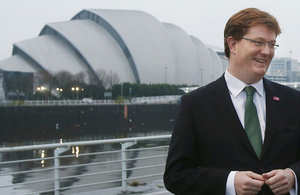Costs of setting up a new Scottish state: article by Danny Alexander
An op-ed by Danny Alexander, Chief Secretary to the Treasury.

Danny Alexander in Glasgow
This week it was revealed that Alex Salmond has asked his officials to cobble together a report on the costs of setting up a new Scottish state.
It comes after almost three weeks of confusion and misinformation from the Scottish government. At one point the First Minister seemed to pull out a number out of thin air, claiming that the cost of setting up a new state was around £200 million.
Another time we had to listen to Salmond’s finance minister John Swinney fail to answer a direct question on set up costs 13 times during a live radio interview.
That is when they really descended into farce, making up a hotchpotch of excuses: saying that their analysis on this issue was “ongoing”, that they were not doing any more work on it, or that the costs would not be known until after the referendum.
It is totally implausible that the Scottish government have done no work on the cost of setting up a new state – particularly after John Swinney told his cabinet colleagues, in his secret memo two years ago, that the work was “currently underway in Finance and OCEA to build a comprehensive overview of the institutions, costs and staff numbers which I will draw together”.
I suspect any rushed last-minute exercise is mainly an attempt to distract journalistic attention from seeking the paperwork the Scottish government are desperate to keep secret until after polling day.
Alex Salmond has belatedly recognised his responsibility to provide some real facts in this important debate. This is just what we in the UK government have been doing for the past 18 months, to help inform voters in Scotland ahead of the referendum.
While they are finally doing the work they promised would be done two years ago, it is disappointing that they’re only doing it because they’ve been found out to be completely clueless on the matter. I believe there are two reasons why we should take any of their work on this issue with a big pinch of salt.
First, because we all know that previous Scottish government analysis has often been short in real facts, and rather muddied the waters rather than helped make the situation clearer, we will need to scrutinise any new findings. In particular:
- will it reflect the cost of setting up a new tax administration system? Independent experts at ICAS have pointed out that less complex changes than this are costing £750 million in New Zealand
- will it include the cost of setting up a new welfare and benefits delivery department? According to research from the Department of Work and Pensions a new welfare and pensions IT system alone would cost between £300 million and £400 million
- will it put a cost on a new diplomatic network? The European and External Relations Committee last week called for the Scottish government to give the set up costs of this
- will it include the cost of producing a new currency?
- what about the cost of setting up a new defence capability?
- what about the 180 public bodies that the Scottish government themselves say (in page 363 of their white paper) will need to transfer their functions to new or existing bodies in Scotland?
These are some of the questions that will need answering. It seems to me that if reorganising Scottish local government in the mid-1990s cost £281 million, and building the new Queensferry Crossing cost £1.4 billion, then setting up a whole new state for less than that doesn’t really sound credible.
The second test we need to apply is about the Scottish government’s general approach to key questions regarding the referendum. If it took all this pressure to get them to admit that they were looking at set-up costs then, what else are they hiding?
Time and time again they keep rushing their analysis through, producing flimsy research with little independent backing. When it suits them they assume the most unrealistic and optimistic assumptions. As Professor Piachaud of the London School of Economics explained in an open letter last month: “I am however certain that the evidence put forward to support the claim that Scotland, as a smaller but independent nation, could expect to grow faster simply does not stand up to scrutiny.”
This is why I am still left with a feeling that you cannot really trust them – they will say anything to try and stack up their numbers.
Compare that to our approach – project fact – providing thorough and detailed analysis of the relationship between the UK and Scotland.
If it’s facts you want, only one government is providing them.